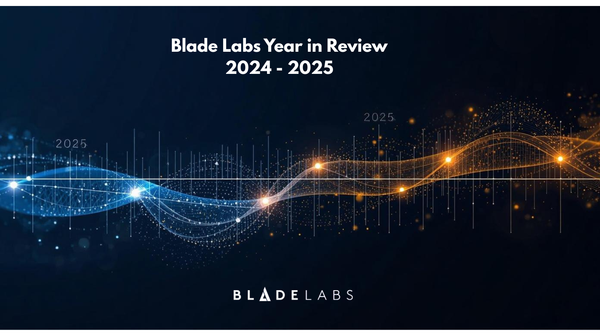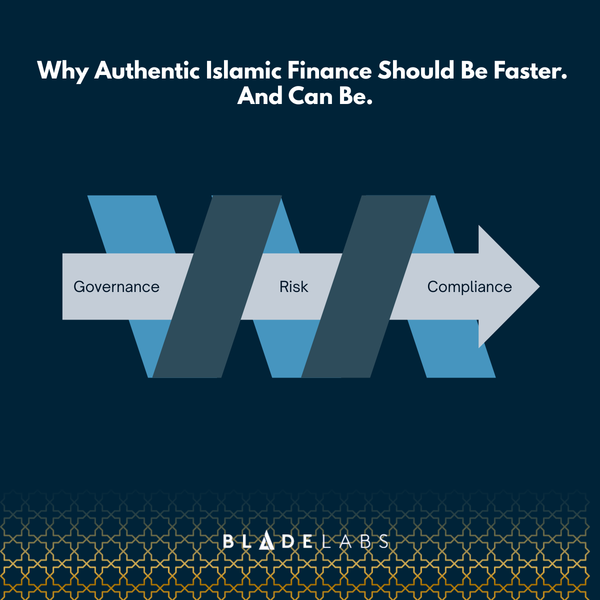Digital Receipts on Blockchain: A Proof of Concept for Islamic Finance

Part 1 of our Digital Receipts on Blockchain series
Islamic finance has operated for over 1,400 years, guided by principles of fairness, transparency, and ethical investment. Today, this $4 trillion industry faces opportunities in digital transformation. At Blade Labs, we're working to connect these principles with blockchain technology through a structured proof of concept that respects tradition while exploring innovation.
The Foundation: Understanding Islamic Finance
Islamic finance operates on principles derived from Sharia law. These include:
- Prohibition of Riba (Interest): Money cannot generate money; profits must come from economic activity
- Asset-Backed Transactions: Financial transactions must be tied to tangible assets
- Risk Sharing: Profits and losses are shared between parties
- Transparency: Terms and conditions must be clear to all parties
- Ethical Investment: Investments in certain industries are prohibited
These principles create a financial system focused on economic value, social responsibility, and wealth distribution. Implementing these principles in today's digital economy presents practical challenges.
The Challenge: Complexity in Modern Finance
Islamic financial institutions must deliver services with speed and convenience while maintaining Sharia compliance. Consider a car financing transaction under Murabaha (cost-plus financing). The bank must:
- Purchase the vehicle from the dealer
- Take ownership before selling to the customer
- Document each step with contracts
- Ensure pricing transparency with disclosed profit margins
- Transfer ownership to the customer
- Track payments over years
Each step requires documentation, verification, and compliance checks. With thousands of transactions daily, operational complexity increases. Manual processes can lead to delays, costs, and errors that might affect Sharia compliance.
The Approach: Blockchain as Potential Infrastructure
Blockchain technology offers potential applications for Islamic finance. Beyond cryptocurrency applications, blockchain creates records of transactions without requiring intermediaries.
For Islamic finance, blockchain offers features that may support Sharia principles:
- Visibility: Transactions are recorded and visible to authorized parties
- Record Integrity: Recorded transactions remain consistent
- Process Automation: Smart contracts can execute according to Sharia rules
- Verification Capability: Ownership and compliance can be verified quickly
- Documentation Management: Records help minimize disputes
- Application: Digital Receipts for Ownership Tracking
Our proof of concept explores creating digital receipts for Islamic financing arrangements. When a customer enters a Diminishing Musharakah (partnership) agreement to purchase a home, traditional processes involve paper documents tracking ownership percentages over years.
The blockchain solution being tested aims to create digital receipts that:
- Document ownership percentages at specific points in time
- Update as payments are made
- Provide verification security
- Remain accessible to parties when needed
This approach supplements legal contracts rather than replacing them. The proof of concept tests a verification layer that may make the process more efficient and transparent.
From Concept to Testing: Qatar Financial Centre POC
This concept is being tested through a structured 6-month Proof of Concept (POC). Recently, the Qatar Financial Centre (QFC) announced this POC under its Digital Asset Lab, bringing together industry partners to explore blockchain applications in Islamic finance.
The POC operates within QFC's regulatory framework, with QFC orchestrating the project and providing infrastructure support. Blade Labs serves as the technology partner developing specific components of the Digital Receipt System. Hashgraph provides the underlying HashSphere platform as the distributed ledger infrastructure, while AlRayan Bank validates functionality and provides domain expertise in Islamic finance. Google Cloud delivers the cloud infrastructure foundation for the initiative.
This POC specifically focuses on testing digital receipts for multiple Islamic finance transaction structures, with paper contracts remaining the legal authority while the system provides supplementary digital verification.
To dive deeper into how blockchain technology enhances governance in Islamic finance, read our next article: Blockchain Technology Doesn't Replace Governance, It Enhances It.
Technology Supporting Human Judgment
A misconception about blockchain in Islamic finance is that it replaces human oversight. The approach in this POC supports human decision-making rather than replacing it.
Sharia scholars retain authority over religious compliance. Blockchain aims to help ensure their rulings are implemented consistently. Bank officers control business decisions. The technology executes these decisions with precision.
Blockchain handles compliance and record-keeping tasks, allowing experts to focus on judgment, relationships, and decisions.
The Path Forward
Through this POC with Islamic financial institutions, we aim to test how blockchain might address business challenges while maintaining Sharia compliance. The project seeks to demonstrate potential benefits: reduced operational costs, faster processing times, increased customer confidence through transparency, and enhanced oversight capabilities for regulators.
This exploration uses digital tools to support Islamic finance's mission of promoting economic justice and prosperity. At Blade Labs, we're testing connections between tradition and future possibilities.
The digital transformation of Islamic finance continues to evolve. The question remains how institutions can adapt while maintaining their values. This POC tests whether innovation can respect tradition while exploring future opportunities.
For a deeper understanding of how timing and timestamps ensure Shariah compliance, explore Time, Trust, and Transparency: Timestamps in Islamic Finance Operations. And to learn more about the Qatar POC launch and its implications, read our newsletter Issue 3: Strengthening Islamic Finance Infrastructure.
To learn more about digital solutions for Islamic finance, visit zeroh.io


